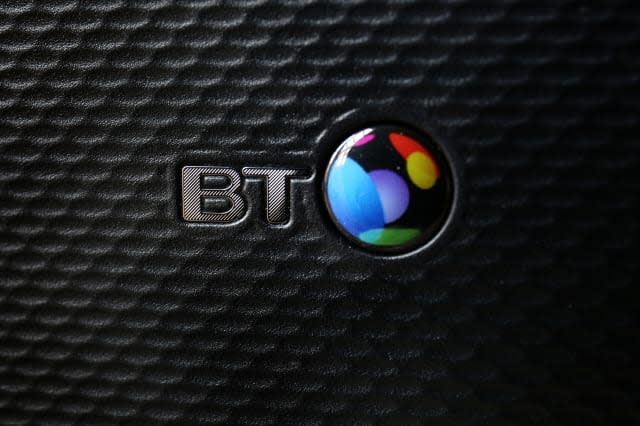BT unveils plans to tackle £7bn pension deficit

BT has revealed that its pension deficit has swollen to £7 billion as it agreed a 16-year recovery plan that will include £2 billion in payments over the next three years.
The deficit for the scheme, which has 300,000 members - around 40,000 of them current employees - has grown from £3.9 billion in 2011. BT said it reflected the low interest environment.
The disclosure came as BT also unveiled plans to roll out "ultrafast" broadband delivering internet speeds six times faster than those currently available, starting from the 2016/17 period.
Its "G.fast" technology, which will be tested at pilot locations this summer, will help deliver a service of up to 500Mbps to most of the UK within a decade, BT said. Currently BT's "superfast" fibre network delivers speeds of up to 80Mbps.
In a trading update, the group also said pre-tax profits for the third quarter to the end of December were £814 million, up 13% from the same period a year before and ahead of expectations.
BT said it added 119,000 broadband customers during the period. Its offering has been bolstered by the offer of free Premier League football, as it vies for business against rivals such as Sky and TalkTalk.
Analyst Paul Kavanagh questioned whether the pensions charge would impact on the telecoms giant's sports ambitions, as the round of bidding for the next set of Premier League TV rights gets under way.
Meanwhile the group said it was making "good progress" in its plan to buy the EE mobile phone network for £12.5 billion.
BT's previous pension deficit announcement in 2011 saw £2.6 billion paid off in the first three years, representing 67% of the shortfall.
The latest plan to pay off £2 billion in the first three years represents 29% of the larger sum, with further instalments planned through to 2030.
Finance director Tony Chanmugam said: "We remain focused on our prudent financial policy of investing in our business, reducing net debt, supporting the pension fund and paying progressive dividends."
Chief executive Gavin Patterson said the 16-year recovery plan reflected "the strength and sustainability of our future cash flow generation".
Mr Patterson also revealed that its roll-out of superfast fibre broadband - which can also be used by other providers - now covered around three quarters of the UK.
Pilots for its new "G.fast" technology will take place this summer in Huntingdon, Cambridgeshire and Gosforth, Newcastle, with around 4,000 homes and business able to participate.
Mr Patterson denied that the growth in the pension deficit would impact on BT's sports ambitions.
He said: "It won't. The payments that we are making in to the scheme in the next three years are less than the payments we have made in the last three years."
Mr Patterson pointed to the fact that the level of the deficit was affected by ultra-low interest rates.
He said: "I would hope that at some point in the next 16 years, rates reach more long-term norms again. These are slightly unusual times."
Finance director Mr Chanmugam said: "Our financial plans have been based on this level of pension deficit payment and it is not going to impact because it is very much in line with financial plans."
Meanwhile, Mr Patterson reiterated that BT is planning to launch consumer mobile phone services before the end of the financial year - which finishes on March 31 - but that the way this was done would be affected by the EE deal.
It already offers mobile to business customers through a wholesale tie-up with the EE network and had been planning the wider roll-out before its takeover plans emerged, which should mean it will own the company.
Mr Patterson said: "Clearly the fact that we are hoping to conclude a deal with EE will have an impact on our thinking of how to really drive that launch."
There was no announcement on the merger today but it is understood the period of exclusive talks will expire in the next couple of weeks.
Mr Patterson added that BT was aware of both the risks and drawbacks of spending big money on Premier League football as it gears up for the latest rights auction.
It is currently in the midst of a £738 million three-year deal to show 38 games a season, which has muscled in on Sky's turf. It has also bought Champions League rights for three years, starting from this autumn, for £897 million.
Mr Patterson said: "We are very clear on our strategy. Clearly there are risks. We are very conscious of those risks.
"We are also very clear on how sport, in particular the Premier League, can add value to our proposition for customers. We are very, very clear in what we are going for and what we want but we won't overpay."
BT said its roll-out of fibre broadband technology means it now covers almost 22 million premises, about three quarters of the UK.
It said the number of homes and businesses connected grew to more than 3.7 million, with a record 375,000 net connections during the quarter - 44% of which were for external provider customers.
BT's own branded service added 209,000 fibre customers, taking its base to more than 2.7 million.
Revenues from the consumer division were up 7% to £1.08 billion with a 15% increase in broadband and TV revenue.
Read more on AOL Money
New pension rules: how to avoid a huge tax bill
Think climate change won't affect your pension? Think again




